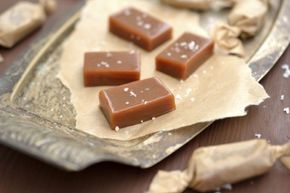Salty and sweet -- a treat for the palate that we've been enjoying for years. Whether you spend late nights dipping pretzel sticks in peanut butter, enjoying Cracker Jacks, tin roof sundaes, or occasionally indulging in expensive chocolate with sea salt or salted caramels, you just can't resist that creamy, sweet confection with the finish of earthy salt to balance it all out. Is your mouth watering right now?
Salted caramel flavor, in particular, moved through the American consciousness in the way many trends do. It started in high-end restaurants and gourmet shops, then appeared in top chain restaurants and premium supermarkets before finally showing up in superstores like Walmart. Assimilation complete.
Advertisement
But where did salted caramel come from? Like most gourmet patisserie treats, we can trace it back to France, and a chocolatier by the name of Henri Le Roux. Le Roux's father, Louis, owned a pastry shop. After apprenticing in the family business, Henri moved to Switzerland to learn the chocolate trade at the Coba Institute, which at the time was the only candy school in the world.
He returned to the family store in 1965 to take over the reins, and then sold it in 1977 to open another shop with his wife in Brittany, France. Brittany is famed for its salted butter. As Henri wracked his brain trying to figure out a product to differentiate him from other chocolatiers in the area, he struck gold. Or butter, as it was.
Because of the proliferation of high quality, delicious salted butter in the region, he knew he wanted to highlight that ingredient. After months of testing, he came up with his crowning achievement -- a salted butter caramel with crushed nuts for a unique texture. In his first year, he sold 880 pounds (399 kilograms) of it, and it only grew from there [source: Henri Le Roux]. In 1980, he won the award of "Best Sweet in France" by the Salon international de la confiserie in Paris. And, in 1981, he wisely registered the name CBS for caramel au beurre salé (salted butter caramel) to prevent copycats.
You can visit the many Henri Le Roux candy shops in France to try the caramels and chocolates for yourself. (Warning: they're extremely addictive.)
This raises the question: just what is so appealing about sweet and salty together?
The simple answer? Layering. Layering two flavors equals twice the flavor. Sweet is pleasurable to our bodies because it signals calories and energy. Salt is pleasurable because it's a compound our bodies need to function. Salt is also a flavor enhancer. The trick, however, is to get the salt ratio just perfect. Too much salt will overstimulate your bitter and sour receptors, and the treat you're expecting will taste terrible. It's that sprinkle, that just-barely-there dash of salt in the sweet that awakens your taste buds and sends that pleasure to your brain.
The next time you enjoy a salted caramel candy, or a salted caramel coffee drink, take a moment and thank Mr. Henri Le Roux.
Advertisement
